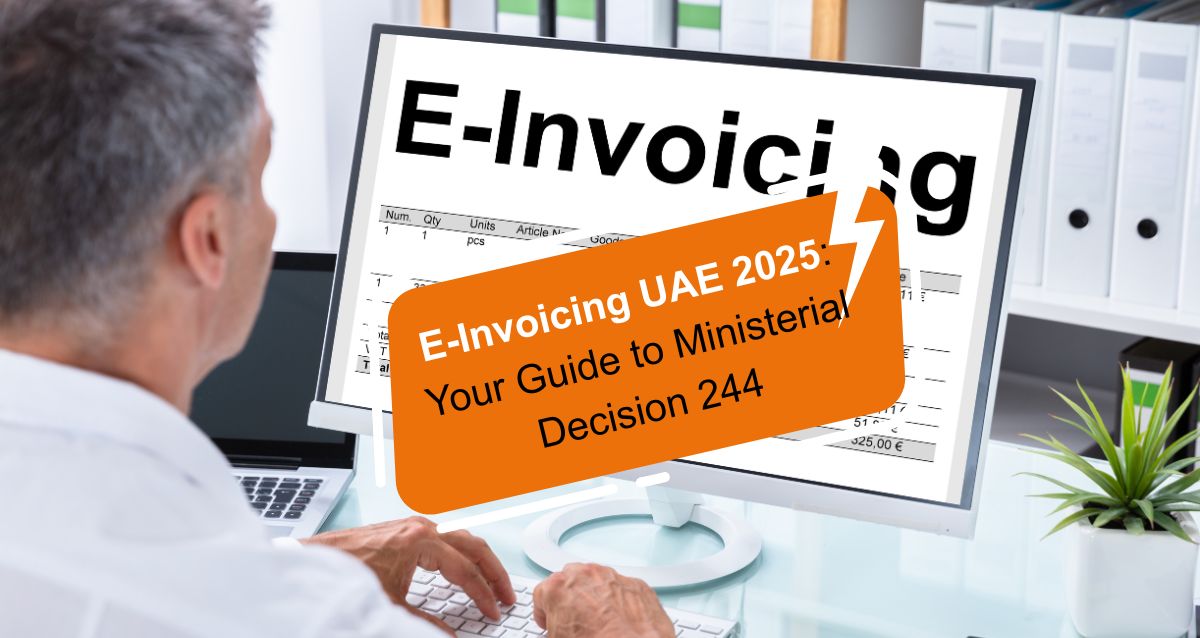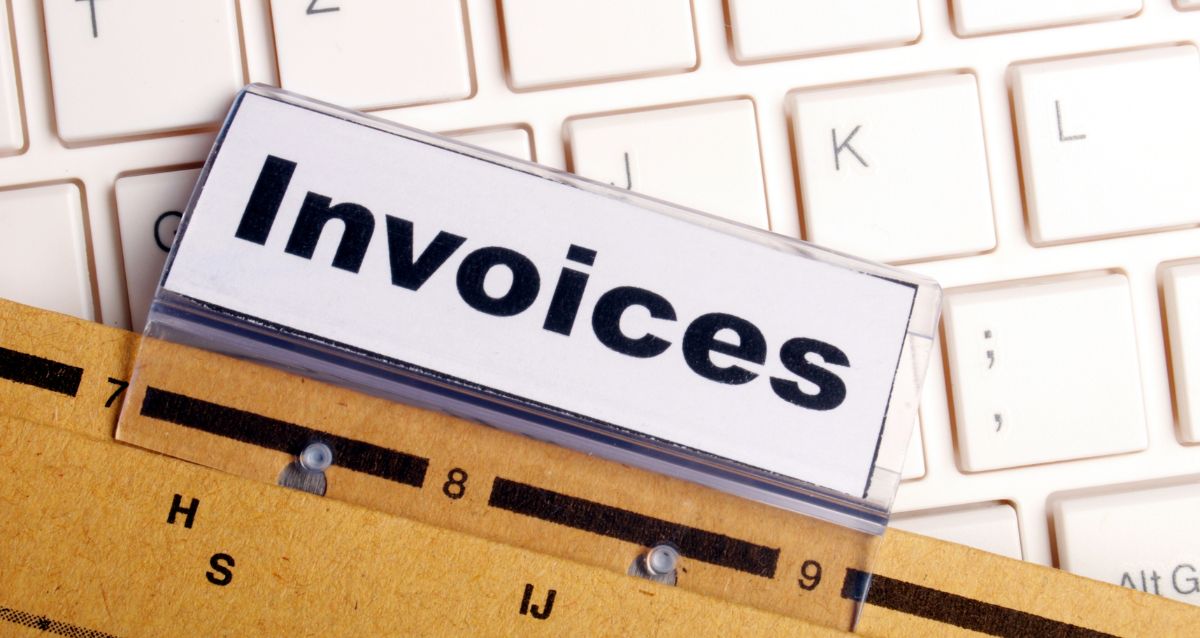E-Invoicing UAE 2025: Your Guide to Ministerial Decision 244
The UAE is moving closer to a fully digital tax system. With the release of Ministerial Decision No. 244 of 2025, the Ministry of Finance has introduced a practical roadmap for implementing the Electronic Invoicing System e-Invoicing.
This new decision builds on Ministerial Decision No. 243 of 2025, which set the rules for e-invoicing. The new rules explain who needs to follow the system, when it applies and how it will work. These changes represent a significant step towards greater transparency, efficiency, and compliance with international standards, which are already in place in Saudi Arabia, India, and many European Union nations.
In this blog, we highlight the key points of Ministerial Decision No. 244 of 2025, which explains the implementation stages and how businesses can get ready for it.
What is the Electronic Invoicing System?
All VAT-registered businesses in the UAE must generate, share and store the invoices digitally using the Electronic Invoicing System.
E-invoices differ from paper or PDF invoices, it was:
- Generated in digital format, such as XML or UBL format.
- Sent through the Federal Tax Authority (FTA) platform
- Validated instantly by ensuring all the information was accurate and compliant.
Under this new system, all tax invoices, credit notes and debit notes need to follow the rules, mainly for B2B transactions.
Ministerial Decision No. 244 of 2025 – Key Highlights
1. Scope of Application (Article 2)
The e-invoicing system applies to:
- All VAT-registered businesses are required to use the e-Invoicing system.
- Any businesses that join voluntarily.
- Any other persons or government entities specified by the Ministry.
Exemption: Businesses that deal only with B2C (business-to-consumer) are not required to use e-invoicing for now. However, the minister may decide to include them in the future
2. Pilot Programme (Article 3)
- The ministry will inform selected businesses if they are part of the Taxpayer Working Group.
- A business can join the group voluntarily, and it should be in a written agreement to participate.
- Businesses that join the group must follow all technical requirements set by the Ministry and Federal Tax Authority for using the e-invoicing system.
- The Pilot Programme will start on 1 July 2026.
Why this matters: The pilot programme gives large businesses a chance to test the system, fix any issues, and get ready for e-invoicing before it becomes mandatory.
3. Voluntary Implementation (Article 4)
- Starting from 1 Jul 2026, any VAT-registered businesses have the option to opt for the e-invoicing system voluntarily.
- Voluntary adopters must meet the same technical standards as mandatory users (e.g., FTA-approved ERP systems, XML formats).
4. Mandatory Implementation (Article 5)
The progress of the e-invoicing system will follow the following stages:
1. Phase 1 – Mandatory Actions for Large Businesses (Annual revenue ≥ AED 50 million):
- Must appoint an Accredited Service Provider no later than 31 July 2026
- Start using the e-invoice system from 1 January 2027
2. Phase 2 – Mandatory Action for Medium-Sized Businesses (Annual revenue < AED 50 million):
- Must appoint an Accredited Service Provider no later than 31 March 2027
- Start using the e-invoice system from 1 July 2027
3. Phase 3 –Actions for Government Entities
- Must appoint an Accredited Service Provider no later than 31 March 2027
- Start using the e-Invoicing system from 1 October 2027
4. Final Phase – Every Business
Once the previous phases are done, all other businesses and government entities should hire an Accredited Service Provider to set up the e-invoicing system.
This step-by-step process gives the businesses time to get ready, which ensures everyone uses the e-invoicing system by 2027.
5. Technical Requirements
- Every taxpayer must comply with the registration and onboarding process defined by the Ministry and Federal Tax Authority before issuing invoices electronically.
- Businesses are only allowed to work with Accredited Service Providers (ASPs) who are approved under Ministerial Decision No. 64 of 2025.
- To support the e-invoicing, all businesses must update their ERP or accounting systems by :
- Creating invoices in XML or UBL formats: These standardised digital formats make it easier to submit the invoices electronically through a universal format.
- Real-time invoice validation with the FTA: Invoices should be verified instantly to avoid errors before they are issued to customers.
- Secure electronic storage of invoices: All invoices should be stored safely in digital format for at least 5 years.
Example Scenario (Fictional)
Case: Sunrise Trading LLC, with revenue of AED 60 million
- As per Ministerial Decision No. 244, Sunrise Trading LLC falls under phase 1 of the e-invoicing implementation plan.
- Sunrise Trading should enter into a contract with an FTA-accredited e-invoicing service provider on or before 31 Jul 2026 for timely integration and testing.
- From 1 January 2027, Sunrise Trading must issue all tax invoices and credit/debit notes electronically in compliance with the FTA format.
Failure to comply with the e-invoicing requirements could result in administrative penalties imposed by the FTA, unnecessary audit risks and potential business delays from B2B customers and may reject the transactions that do not meet e-invoicing standards.
Exemption for B2C Transactions
As per Article 5(2) of MD 244 of 2025, businesses that deal only with consumers (B2C transactions) are not required to use the e-invoicing system until a future decision is issued by the Minister specifying when it will apply to them.
Example:
A café in Dubai earning AED 3 million a year and selling only to walk-in customers doesn’t need to use e-Invoicing right now. However, it will have to follow e-Invoicing rules once the Minister includes B2C businesses in the system.
Penalties for Non-Compliance
While MD 244 does not list out the specific fines, companies that do not comply with the e-invoicing requirements may incur penalties similar to current VAT administrative fines, such as:
- Invoices are not issued as per the FTA-approved format.
- Not completed the onboarding procedure for the accredited e-invoicing service provider on time
- Failure to maintain electronic invoice copies for the required period.
Businesses will face fixed fines per violation and percentage-based penalties for VAT under-reporting.
Benefits of E-Invoicing for Businesses
While switching to e-invoicing may feel like an extra burden, it brings clear advantages for businesses:
- Reduced Errors: Automating invoices should help to reduce human mistakes, such as incorrect amounts, missing fields, and calculation errors, compared with manual invoicing.
- Faster Payments: Instant Validation of invoices with FTA ensures that the invoices are accurate and compliant, helping B2B customers approve and pay invoices more quickly.
- Audit Readiness: All invoices are safely stored and readily available for the FTA, making audits easier and maintaining transparency in tax reporting.
- Global Alignment: UAE businesses that adopt OECD-based digital tax standards remain compliant and internationally competitive.
What Businesses Should Do Now
- Assess Eligibility: Check your annual revenue to know the e-invoicing phase and compliance deadlines under MD 244/2025.
- Choose an ERP Partner: Make sure your current accounting or ERP system meets FTA-compliant e-invoicing requirements such as XML or UBL formats and real-time validation.
- Select an Accredited Service Provider: Appoint an FTA-accredited service provider, which was mandatorily required under Ministerial Decision No. 64 of 2025, to ensure secure integration and compliance.
- Train Staff: Conduct training for your finance and accounting teams about the e-invoicing, XML/UBL formats and FTA submission requirements to maintain smooth and compliant daily operations.
- Pilot Test Early: Join the voluntary pilot phase in July 2026 to test your systems, fix any issues and ensure a timely transition before it becomes mandatory.
Conclusion
Ministerial Decision No. 244 of 2025 sets out a clear image for opting UAE’s Electronic Invoicing System.
- Companies having annual revenue of AED 50 million or more fall under phase 1 of e-invoicing, and they must make sure that all the invoices are issued electronically and in FTA-approved formats by 1 January 2027.
- Businesses with revenue less than AED 50 million and government entities should follow the e-invoicing system later in 2027.
- Even before the mandatory deadlines, businesses can opt e-invoicing system voluntarily in July 2026 to test their systems and fix any issues for a smooth and timely transition.
- Businesses that sell only to consumers (B2C) are temporarily exempted and only need to opt for the e-invoicing system once the Minister issues a future decision.
For Dubai-based businesses, early preparation is crucial to avoid penalties, maintain smooth operation, and stay compliant with FTA regulations.
How Flyingcolour Tax and Consultant Can Help?
At Flying Colour Tax Consultant LLC, we assist businesses in:
- Assessing e-Invoicing obligations under MD 243 & MD 244 of 2025
- Upgrading ERP and accounting systems for compliance
- Liaising with FTA-accredited service providers
- Training staff and managing the full VAT compliance lifecycle.
To learn more about UAE Electronic Invoicing System: Understanding Ministerial Decision No. 244 of 2025, book a free consultation with one of the Flyingcolour team advisors.
Disclaimer: The information provided in this blog is based on our understanding of current tax laws and regulations. It is intended for general informational purposes only and does not constitute professional tax advice, consultation, or representation. The author and publisher are not responsible for any errors or omissions, or for any actions taken based on the information contained in this blog.




